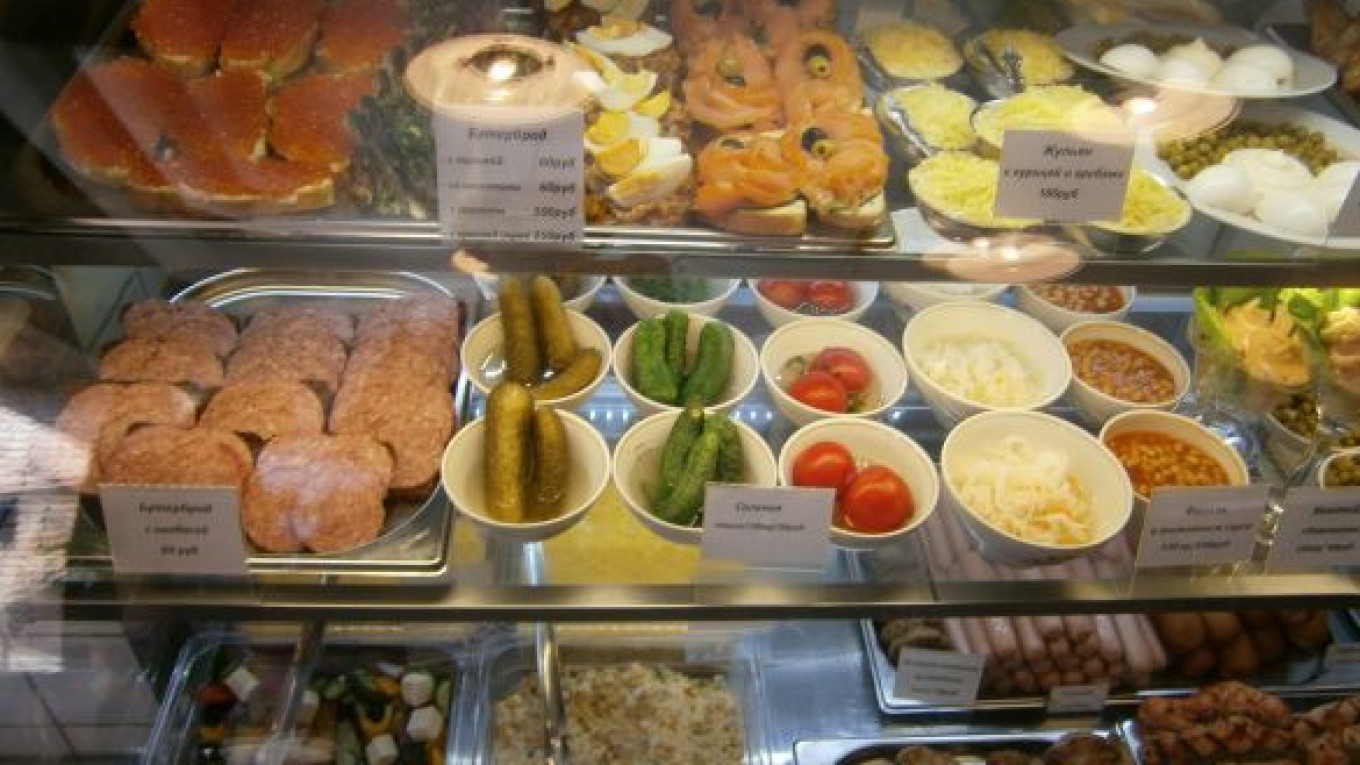Muscovites are rushing to get a taste of nostalgia at a new beer bar based on the infamous Soviet-era stolovayas, based in the very heart of the capital's glitzy center.
Wedged between a Diane von Furstenberg designer store and the Vogue Cafe and facing squarely towards the designer temple of TSUM, Kamchatka bar is a surprising find — and a glimpse into the city's Perestroika-era past.
Visitors can pick out retro favorites including open sandwiches with caviar, salad Olivie, and bowls of prawns from the retro-style glass fronted cabinet, all loaded onto the familiar greyish trays of the Soviet-era canteens, and offered at bargain prices. Egg mayonnaise with green peas goes for 50 rubles, while a half liter of the house beer is just 70 rubles.
The creation of star restauranter Arkady Novikov, whose website says the bar was designed "with a sense of nostalgia for soviet aesthetics," is already proving popular with the city's drinkers, though many were too young to remember the era the first time round.
It's certainly not the first bar to take on the classic stolovaya as inspiration — nearby GUM shopping center has long hosted it's own modernized take on the canteen, while the Zhiguli beer sponsored stolovaya off the Arbat is usually packed with people grabbing a bite to eat.
But Kamachatka stands alone in bringing a fashionable buzz back to the stolovaya. By Thursday night, the terraces at Kamchatka bar are already packed out with Moscow's new breed of hipsters and students, while office workers sip post-work pints in the more formal waiter-served downstairs hall.
And at lunchtime the next day the bar was still packed with a mixture of students, office workers and shoppers.
"It's good to find such an accessible place in the center," commented architecture student Alexei Korolev, 20.
"It's a very pleasant place — all of my friends meet up here and there is a very creative, free atmosphere. I very much like the contrast with the area, between this place and the very expensive cafes. It's unique."
His friend, legal student Nikolai Svetovidov, 21, added his approval for the bar's democratic pricing structure, marvelling: "In the center of Moscow you can eat caviar and drink beer!"
Photo editor Tanya Sharapova, 28, who was also enjoying the sunshine on the terrace, said: "I work nearby — we come here for lunch."
She said that the bar was not a genuine stolovaya, but suggested its retro styling was likely to be popular with young people as it took them back to happy childhood memories.
Bar manager Anton Opopkin, 23, said: "I think it's fashionable — everybody follows fashion and old-fashioned things are becoming popular again."
And one medical worker commented simply: "It's a decent bar. What's older is better."
A spokesman for Mr. Novikov has said that the bar will be profit making, thanks to the large number of customers passing through, adding, "We are not talking about raising the prices."
"Bar Kamchatka is a place about food and about nostalgia," she said.
"Everyone feels a sense of nostalgia for Soviet aesthetics, even those who were born after the end of the Soviet Union. They feel nostalgia thanks to the stories of older generations.
"Many people have discussed the interior design, remembering that their grandparents to this day have bead curtains, or hang panels on the walls (which in the past were considered a symbol of wealth). Others are reminded of hits of the past, and have suggested new dishes to be added to the menu."
One of these, the 1980s favorite egg in mayonnaise with green peas has made record-breaking sales, she added.
A second hall is already partly in use, and will be fully open by the end of November, where customers can enjoy a more formal table service along with a chance to watch sporting events.
Related articles:
A Message from The Moscow Times:
Dear readers,
We are facing unprecedented challenges. Russia's Prosecutor General's Office has designated The Moscow Times as an "undesirable" organization, criminalizing our work and putting our staff at risk of prosecution. This follows our earlier unjust labeling as a "foreign agent."
These actions are direct attempts to silence independent journalism in Russia. The authorities claim our work "discredits the decisions of the Russian leadership." We see things differently: we strive to provide accurate, unbiased reporting on Russia.
We, the journalists of The Moscow Times, refuse to be silenced. But to continue our work, we need your help.
Your support, no matter how small, makes a world of difference. If you can, please support us monthly starting from just $2. It's quick to set up, and every contribution makes a significant impact.
By supporting The Moscow Times, you're defending open, independent journalism in the face of repression. Thank you for standing with us.
Remind me later.






